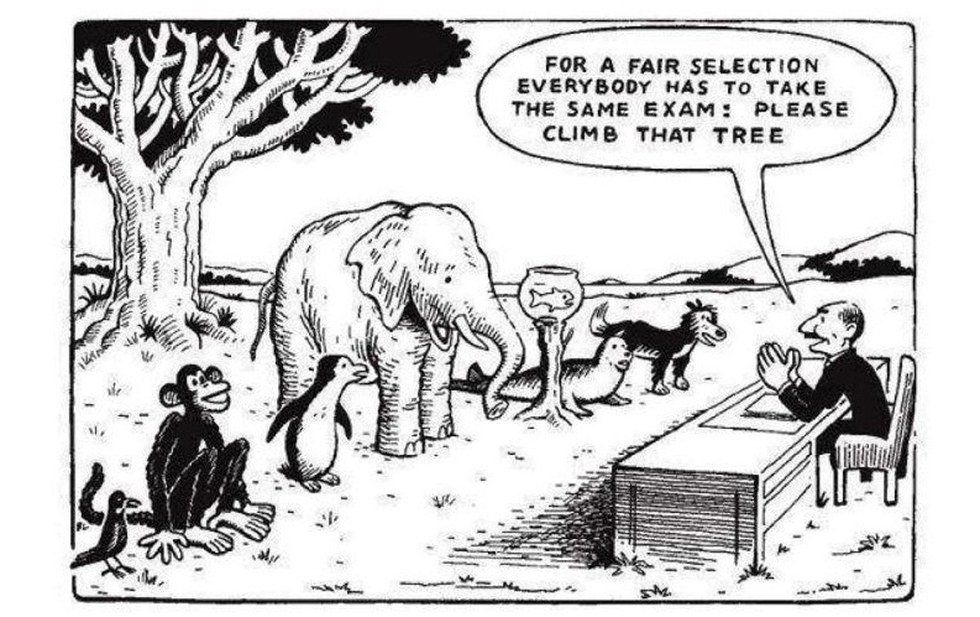It’s a familiar concept, that everyone has his or her own talents, that he or she cannot be judged by preset standards etched into the “must-haves” of society: a society that assigns a hierarchy to various forms of intelligence, often ranking subject matters by preconceived notions of worth, placing fine arts below history, history below language, and language below science and mathematics. Though in theory most agree that equal recognition of various individual gifts is important, such an attitude has yet to replace sentiments that uphold a ladder of predetermination which pervades our society today.
Ever since I was little, I was placed into a box labeled “smart.” I was an avid reader, reading beyond my age and quickly learning to string thoughts and words together. I was an aspiring mathematician, adding and subtracting numbers, multiplying and dividing. But most of all, I was a test-taker, scoring “above average” on tests and evaluations. I was then put into a TAG program for “talented and gifted” students, and, along with those who also classified as “smart,” was subtly yet markedly distinguished from the rest of my peers. It was a seemingly harmless thing, to be put into a once-a-week class where we were encouraged to think creatively and outside-the-box, being taught earlier on the self reliance, personal skill and individuality that students were supposed to develop and TAG students expected to have. Yet to be drawn and weeded out from among our peers, distinguished by levels of "intelligence," meant nothing then and still means nothing now.
As we progressed through the mechanical institution that is education, we diverged at a crossroads that defined our school pathways: on-level, advanced and accelerated. Yes, such divisions were always meant to tailor learning to students performing at different levels, but it also engendered a system of labels assigned to students at each tier, thereby defining who was “smart” or “bright” as opposed to “needs more work.” These labels were handed out by an invisible yet governing hand and students willingly assumed them, allowing such labels to make a generalization as to where they stood on the ladder of a preconceived intelligence.
But the intelligence we were measured against was nothing. No, we were separated based on our abilities to score. We were separated based on our abilities to bubble in the right answers, to be able to read a passage and fill in the corresponding letter that would best describe the tone of the author. To be able to solve a math problem and swiftly punch in the correct numbers in the correct order, to calculate and produce the right numbers. We were tested, over and over and over again. Tested on our creative skills so that we might make it into TAG, and tested on the strength of our memories to regurgitate information we had learned in the few weeks. And soon enough, with an unending cycle of test taking repeatedly pounded into our heads, we were made into star test-takers. We were smart.
But then I realize I am wrong in stating “we.” We entails everyone that was in TAG or deemed smart. But perhaps it was not “we,” but simply me. While those around me found direction, I had found satisfaction in receiving high scores and upholding the standards that I had felt was set for achieving students. I had blindly pursued numbers, numbers that told me I was doing well, numbers that I had found success in. But I knew that numbers was not intelligence, for I had gotten this far by memorizing facts, numbers, methods, processes and training myself to cram, to learn just enough to spit information back out perfectly, flawlessly, on test day.
Like Erica Goldson, I had found myself mechanically taking notes while my classmates were reading up on the latest developments in mobile technology, politics and sports. While the girl in front of me drew pictures on her hands and papers, I was practicing the art of note-taking. While the boy behind me made finishing touches on building a robot, I was becoming one. One wired in the fake necessity of working charts, graphs and data over a genuine passion or interest.
I realize I am lost, lost in the multitude of statistics and numbers, numbers and statistics, that seek to produce hundreds, thousands of pawns in a mechanized process of listening, studying, memorizing, functioning. How far will simply testing well take me? For ironically, the world does not need mechanical people, robots that cannot think for themselves and instead spew out the right answers, for they do not exist. Where there should be complexity, I find a void instead. Where there should be thought and opinion, I instead find a darkness, an abyss that threatens to engulf any light of creativity or innovation. And instead of seeking to emerge from it, I delve deeper and deeper into its grasp as I work harder and harder for perfect scores, yearning for the one thing that I feel can prove my worth. That I might, perhaps, be something more than simply a steely invention rooted in nothing. For I justify my sleepless nights with a cocktail of grim determination that I might not lose the one thing I believe to have going for me now and overarching fear to let go of the one thing that has always seen me through: scores. But how much longer, I don’t know.
Nevertheless I swim deeper, deeper, deeper into an endless depth of uncertainty in pursuit of a nonexistent reassurance, when in fact, I am certain that a passion, an intelligence specific to its bearer, is the beacon that makes “geniuses.”





















